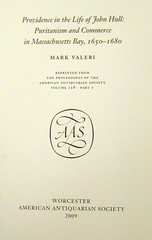
PREV ARTICLE
NEXT ARTICLE
FULL ISSUE
PREV FULL ISSUE
NEW OFFPRINT: PROVIDENCE IN THE LIFE OF JOHN HULL BY MARK VALERI Thanks to Dave Bowers for forwarding word of a new offprint from the American Antiquarian Society about a key figure in colonial American coinage: Valeri, Mark. Providence in the Life of John Hull: Puritanism and Commerce in Massachusetts Bay, 1650-1680, 2008. 61 p. From the Proceedings for Apr. 2008, pages 55-116. Offprint number: 1035 $15.00 plus $4 shipping and handling. Jackie Penny (a great numismatic name) of the AAS forwarded the following images and abstract. -Editor  The very landscape of Boston, through which credit and goods flowed to the rest of New England, symbolized the civic prominence of Hull and his colleagues. They erected and maintained forty wharves through the early eighteenth century, promoted the construction of two waterfront batteries and a seawall, owned twelve shipyards, and employed more than one thousand vessels. The very landscape of Boston, through which credit and goods flowed to the rest of New England, symbolized the civic prominence of Hull and his colleagues. They erected and maintained forty wharves through the early eighteenth century, promoted the construction of two waterfront batteries and a seawall, owned twelve shipyards, and employed more than one thousand vessels. Boston with its maritime infrastructure, and the number of ships entering and leaving, dwarfed competing New England ports. Merchants’ shops dominated certain districts of the town. Constables rang bells to open and close markets at the Town House and other venues, ordering civic time by commercial opportunity. Merchants built the town’s most elaborate houses, clustered in their own neighborhoods. They lobbied for and oversaw the construction of roads, bridges, and ferries linking the town to inland villages. Topographical markers signified cultural influence. In Boston, even more so than the metropolis of London, men of commerce and their institutions formed the core of the civic, public order. Success in the commercial system amounted to a public leadership. It brought power to Hull and his colleagues.  But knotty relationships emerged between merchants and ministers of the second generation in Massachusetts Bay. The tension centered on the disparity between a Puritan piety that eschewed the use of courts to adjudicate between creditors and debtors and the emerging market economy that relied on debt litigation and a legal culture for expansion. But knotty relationships emerged between merchants and ministers of the second generation in Massachusetts Bay. The tension centered on the disparity between a Puritan piety that eschewed the use of courts to adjudicate between creditors and debtors and the emerging market economy that relied on debt litigation and a legal culture for expansion. Like other devout Boston merchants, John Hull listened to clergy such as Elihu Hubbard, who believed that the fate of New England depended on its civic institutions. Hull’s story represents the importance of theological and moral transformations from within Puritanism—changes in conceptions of the church, providence, and the civic order. To order this and other AAH offprints on economic history, see www.americanantiquarian.org/Offprints/subjecteh.htm Wayne Homren, Editor The Numismatic Bibliomania Society is a non-profit organization promoting numismatic literature. See our web site at coinbooks.org. To submit items for publication in The E-Sylum, write to the Editor at this address: whomren@gmail.com To subscribe go to: https://my.binhost.com/lists/listinfo/esylum All Rights Reserved. NBS Home Page Contact the NBS webmaster 
|